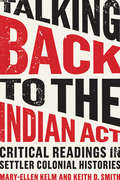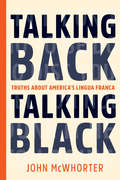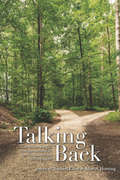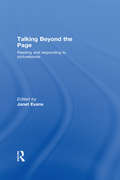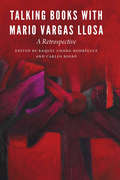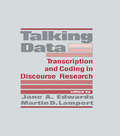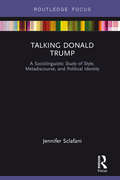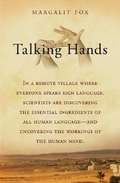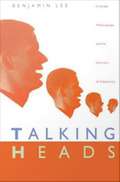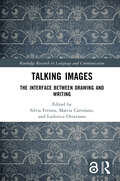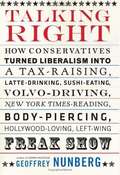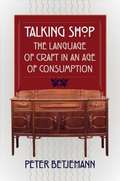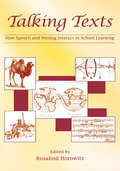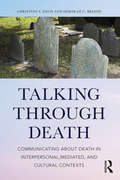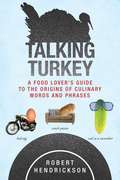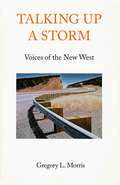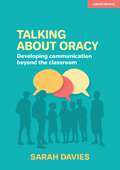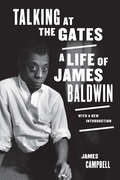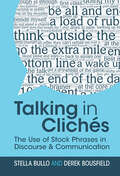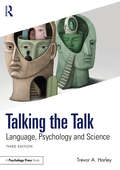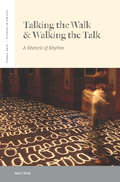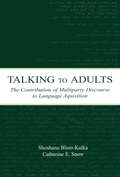- Table View
- List View
Talking Back to the Indian Act: Critical Readings in Settler Colonial Histories
by Keith Smith Mary-Ellen KelmTalking Back to the Indian Act is a comprehensive "how-to" guide for engaging with primary source documents. The intent of the book is to encourage readers to develop the skills necessary to converse with primary sources in more refined and profound ways. As a piece of legislation that is central to Canada’s relationship with Indigenous peoples and communities, and one that has undergone many amendments, the Indian Act is uniquely positioned to act as a vehicle for this kind of focused reading. Through an analysis of thirty-five sources pertaining to the Indian Act—addressing governance, gender, enfranchisement, and land—the authors provide readers with a much better understanding of this pivotal piece of legislation, as well as insight into the dynamics involved in its creation and maintenance.
Talking Back, Talking Black: Truths About America's Lingua Franca
by John Mcwhorter"One of our sharpest explainers of linguistics." -Steven Pinker"In Talking Back, Talking Black, John McWhorter, the maestro at communicating linguistics to the public, succeeds in helping the reader to 'actually hear Black English in a new way,' while hipping linguists to some features of this vibrant variety they might not have considered before." -John R. Rickford, former president of the Linguistic Society of America and coauthor of Spoken Soul: The Story of Black English"McWhorter debunks some of our most persistent myths about language." -NPR"McWhorter makes all the right arguments, and he makes them clearly." -New Yorker"Do you think Black English is a 'dialect' full of 'mistakes'? You're likely to change your mind about its 'languageness' after reading Mr. McWhorter." -Wall Street JournalIt has now been almost fifty years since linguistic experts began studying Black English as a legitimate speech variety, arguing to the public that it is different from Standard English, not a degradation of it. Yet false assumptions and controversies still swirl around what it means to speak and sound "black." In his first book devoted solely to the form, structure, and development of Black English, John McWhorter clearly explains its fundamentals and rich history, while carefully examining the cultural, educational, and political issues that have undermined recognition of this transformative, empowering dialect. Talking Back, Talking Black takes us on a fascinating tour of a nuanced and complex language that has moved beyond America's borders to become a dynamic force for today's youth culture around the world.John McWhorter teaches linguistics, Western civilization, music history, and American studies at Columbia University. A New York Times best-selling author and TED speaker, he is a columnist for Time and regular contributor to the Atlantic, Wall Street Journal, and Washington Post. His books on language include The Power of Babel, Our Magnificent Bastard Tongue, What Language Is, The Language Hoax, and Words on the Move.
Talking Back: Senior Scholars and Their Colleagues Deliberate the Past, Present, and Future of Writing Studies
by Norbert Elliot Alice S. HorningIn Talking Back, a veritable Who’s Who of writing studies scholars deliberate on intellectual traditions, current practices, and important directions for the future. In response, junior and mid-career scholars reflect on each chapter with thoughtful and measured moves forward into the contemporary environment of research, teaching, and service. Each of the prestigious chapter authors in the volume has three common traits: a sense of responsibility for advancing the profession, a passion for programs of research dedicated to advancing opportunities for others, and a reflective sense of their work accompanied by humility for their contributions. As a documentary, Talking Back is the first history of writing studies in autobiography. Contributors: Jo Allen, Ann N. Amicucci, Akua Duku Anokye, Paige Davis Arrington, Doug Baldwin, John C. Brereton, Judy Buchanan, Hugh Burns, Leasa Burton, Ellen C. Carillo, William Condon, Dylan B. Dryer, Michelle F. Eble, Jennifer Enoch, Joan Feinberg, Patricia Friedrich, Cinthia Gannett, Eli Goldblatt, Shenika Hankerson, Janis Haswell, Richard Haswell, Eric Heltzel, Douglas Hesse, Bruce Horner, Alice S. Horning, Asao B. Inoue, Ruth Ray Karpen, Suzanne Lane, Min-Zhan Lu, Donald McQuade, Elisabeth L. Miller, Rebecca Williams Mlynarczyk, Sean Molloy, Les Perelman, Louise Wetherbee Phelps, Stacey Pigg, Sherry Rankins-Robertson, Jessica Restaino, J. Michael Rifenburg, Eliana Schonberg, Geneva Smitherman, Richard Sterling, Katherine E. Tirabassi, Devon Tomasulo, Martha A. Townsend, Mike Truong, Victor Villanueva, Edward M. White, Anne Elrod Whitney, Kathleen Blake Yancey
Talking Beyond the Page: Reading and Responding to Picturebooks
by Janet EvansTalking Beyond the Page shows how different kinds of picturebooks can be used with children of all ages and highlights the positive educational gains to be made from reading, sharing, talking and writing about picturebooks. With contributions from some of the world's leading experts, chapters in this book consider how:children think about and respond to visual images and other aspects of picturebooks children’s responses can be qualitatively improved by encouraging them to think and talk about picturebooks before, during and after reading themthe non-text features of picturebooks, when considered in their own right, can help readers to make more sense out of the bookdifferent kinds of picturebooks, such as wordless, postmodern, multimodal and graphic novels, are structuredchildren can respond creatively to picturebooks as art formspicturebooks can help children deal with complex issues in their livesTalking beyond the Page also includes an exclusive interview with Anthony Browne who shares thoughts about his work as an author illustrator.This inspiring and thought provoking book is essential reading for teachers, student teachers, literacy consultants, academics interested in picturebook research and those organising and teaching on teacher education courses in children’s literature and literacy.
Talking Books with Mario Vargas Llosa: A Retrospective (New Hispanisms)
by Carlos Riobo Raquel Chang-RodriguezThe essays included in Talking Books with Mario Vargas Llosa celebrate Mario Vargas Llosa&’s visits to the City College of New York, the creation of the Cátedra Vargas Llosa in his honor, and the interests of the Peruvian author in reading and books. This volume contains previously unpublished material by Vargas Llosa himself, as well as by novelists and literary critics associated with the Cátedra. This collection offers readers an opportunity to learn about Vargas Llosa&’s body of work through multiple perspectives: his own and those of eminent fiction writers and important literary critics. The book offers significant analysis and rich conversation that bring to life many of the Nobel Laureate&’s characters and provide insights into his writing process and imagination. As the last surviving member of the original group of writers of the Latin American Boom—which included Gabriel García Márquez, Carlos Fuentes, and Julio Cortázar—Vargas Llosa endures as a literary icon because his fiction has remained fresh and innovative. His prolific works span many different themes and subgenres. A combination of literary analyses and anecdotal contributions in this volume reveal the little-known human and intellectual dimensions of Vargas Llosa the writer and Vargas Llosa the man.
Talking Data: Transcription and Coding in Discourse Research
by Jane A. Edwards Martin D. LampertThis book presents the reader with a set of diverse, carefully developed and clearly specified systems of transcription and coding, arising from contrasting theoretical perspectives, and presented as alternative choices, situated within the theoretical domain most natural to each. The perspectives represented include first and second language acquisition, interethnic and crosscultural interaction, information structure, and the study of discourse influences on linguistic expression. In the contributed chapters, the designers of these systems provide a distillation of collective experiences from the past quarter century, telling in their own words their perspectives on language processes, how these perspectives have shaped their choice of methodology in transcription and coding of natural language, and describing their systems in detail. Overview chapters by the editors then provide design principles and guidelines concerning issues pertinent to all systems, including such things as reliability, validity, ease of learning, computational tractability, and robustness against error. The final chapter is a compendium of existing computerized archives of language data and information sources together with details concerning data access and use.
Talking Donald Trump: A Sociolinguistic Study of Style, Metadiscourse, and Political Identity (Routledge Focus on Linguistics)
by Jennifer SclafaniTalking Donald Trump examines the language of Donald Trump’s presidential campaign from the perspective of sociocultural linguistics. This book offers an insight into the many stages of Trump’s political career, from his initial campaign for the Republican nomination, up to his presidency. Drawing from speeches, debates, and interviews, as well as parodies and public reactions to his language, Sclafani explores how Trump’s language has produced such polarized reactions among the electorate. In analysing the linguistic construction of Donald Trump’s political identity, Sclafani’s incisive study sheds light on the discursive construction of political identity and the conflicting language ideologies associated with the discourse of leadership in modern US society. Talking Donald Trump provides a crucial contemporary example of the interaction between sociolinguistics and political science, and is key reading for advanced students and researchers in the fields of sociolinguistics, language and politics, communication studies and rhetoric.
Talking Hands: What Sign Language Reveals About the Mind
by Margalit Fox<P>Imagine a village where everyone "speaks" sign language. Just such a village - an isolated Bedouin community in Israel with an unusually high rate of deafness - is at the heart of Talking Hands: What Sign Language Reveals About the Mind. There, an indigenous sign language has sprung up, used by deaf and hearing villagers alike. It is a language no outsider has been able to decode, until now. <P>A New York Times reporter trained as a linguist, Margalit Fox is the only Western journalist to have set foot in this remarkable village. In Talking Hands, she follows an international team of scientists that is unraveling this mysterious language. <P>Because the sign language of the village has arisen completely on its own, outside the influence of any other language, it is a living demonstration of the "language instinct," man's inborn capacity to create language. If the researchers can decode this language, they will have helped isolate ingredients essential to all human language, signed and spoken. But as Talking Hands grippingly shows, their work in the village is also a race against time, because the unique language of the village may already be endangered. <P>Talking Hands offers a fascinating introduction to the signed languages of the world- languages as beautiful, vital and emphatically human as any other- explaining why they are now furnishing cognitive scientists with long-sought keys to understanding how language works...
Talking Heads: Language, Metalanguage, and the Semiotics of Subjectivity
by Benjamin LeeIn Talking Heads, Benjamin Lee situates himself at the convergence of multiple disciplines: philosophy, linguistics, anthropology, and literary theory. He offers a nuanced exploration of the central questions shared by these disciplines during the modern era--questions regarding the relations between language, subjectivity, community, and the external world. Scholars in each discipline approach these questions from significantly different angles; in seeking to identify and define the intersection of these angles, Lee argues for the development of a new sense of subjectivity, a construct that has repercussions of immense importance beyond the humanities and into the area of politics. Talking Heads synthesizes the views and works of a breathtaking range of the most influential modern theorists of the humanities and social sciences, including Austin, Searle, Derrida, Jakobson, Bakhtin, Wittgenstein, Peirce, Frege, Kripke, Donnellan, Putnam, Saussure, and Whorf. After illuminating these many strands of thought, Lee moves beyond disciplinary biases and re-embeds within the context of the public sphere the questions of subjectivity and language raised by these theorists. In his examination of how subjectivity relates not just to grammatical patterns but also to the specific social institutions in which these patterns develop and are sustained, Lee discusses such topics as the concept of public opinion and the emergence of Western nation-states.
Talking Images: The Interface between Drawing and Writing (Routledge Research in Language and Communication)
by Silvia Ferrara Mattia Cartolano Ludovica OttavianoThis innovative collection offers a holistic portrait of the multimodal communication potential of images from the Upper Paleolithic through to today, showcasing image-based creativity throughout the centuries.The volume seeks to extend the boundaries of our understanding of what language and writing can do to show how language can be understood as part of broader codes, as well as how images and figural objects can contribute to meaning-making in communication. The book is divided into four parts, each exploring a different dimension of the interplay between representation, symbolic meaning, and perception in the study of images, drawing on case studies from around the world. The first part looks at cognitive approaches to the earliest symbol-making while the second considers the interaction between images and writing in early scripts. The third part addresses images outside their boxes, showcasing how ancient communication devices can be reinterpreted. The final part features chapters reflecting on embodied semiotic approaches to the representation of images.This book will be of interest to scholars in semiotics, archaeology, cognitive psychology, and linguistic and cultural anthropology.
Talking Points: Discussion Activities In The Primary Classroom
by Lyn DawesTalking Points: Discussion Activities in the Primary Classroom encourages and supports classroom discussion on a range of topics, enabling children to develop the important life-skill of effective group communication. Children who can explain their own ideas and take account of the points of view and reasons of others are in the process of becoming truly educated. This book offers a straightforward way of teaching children discussion skills within the framework of a creative curriculum. The book provides an introduction on how to help children learn the skills of group discussion, offering six essential Talk Lessons to use in the classroom, alongside suggestions on how teachers can plan their lessons with a talk focus, set learning outcomes and create their own Talking Points to suit topics they are teaching. The main body of the book contains the Talking Points resources which are an excellent, tried and tested way of stimulating and supporting extended talk about a topic. The Talking Points in this book offer model for teachers to create further Talking Points for their own classes. The Talking Points included here offer discussion in several curriculum areas including:- Science Literacy Philosophy and creativity for children History Mathematics Art and Music This invaluable book offers engaging, stimulating and thought provoking ideas for children to pit their wits against, promoting skills in discussion, analysis, reasoning and interaction. It is highly beneficial reading for teachers working in Key Stage 2, head teachers and those responsible for staff development, as well as students on teacher training courses and graduate training programmes.
Talking Right: How Conservatives Turned Liberalism into a Tax-Raising, Latte-Drinking, Sushi-Eating, Volvo-Driving, New York Times-Reading, Body-Piercing, Hollywood-Loving, Left-Wing Freak Show
by Geoffrey NunbergA captivating, indignant, witty story of the "Great Re-labeling" of US language and thought from a master linguist, broadcaster and popular intellectual.
Talking Shop
by Peter BetjemannDescribing everything from bread and cappuccinos to mass-market furnishings, a language of the "artisanal" saturates our culture today. That language, Peter Betjemann proposes, has a rich and specifiable history. Between 1840 and 1920, the cultural appetite for handmade chairs, tables, cabinets, and other material odds and ends flowed through narrative and texts as much as through dusty workshops or the physical surfaces of clay, wood, or metal. Judged by classic axioms about labor's virtue--axioms originating with Plato and foundational to modern theories of workmanship--the vigorous life of craft as represented in these texts might seem a secondhand version of an ideal and purposeful activity. But Talking Shop celebrates these texts as a cultural phenomenon of their own. In the first book to consider the literary representation of craft rather than of labor in general, Peter Betjemann asks how nineteenth and early twentieth-century craftspeople, writers, and consumers managed craft's traditional attachment to physical objects and activities while also celebrating craft in iconic, emblematic, preeminently textual terms. The durable model of workmanship that was created around correlations of craft and narrative, physical process and representation, and body and text blurred the boundaries between craft and its consumption. Discussing a wide range of material from fiction and essays to artifacts, the book explores how the era paved the way for the vitality and the viability of a language of craft in much later decades.
Talking Texts: How Speech and Writing Interact in School Learning
by Rosalind HorowitzThis volume examines how oral and written language function in school learning , and how oral texts can be successfully inter-connected to the written texts that are used on a daily basis in schools. Rather than argue for the prominence of one over the other, the goal is to help the reader gain a rich understanding of how both might work together to create a new discourse that ultimately creates new knowledge. Talking Texts: Provides historical background for the study of talk and text Presents examples of children’s and adolescents’ natural conversations as analyzed by linguists Addresses talk as it interfaces with domains of knowledge taught in schools to show how talk is related to and may be influenced by the structure, language, and activities of a specific discipline. Bringing together seminal lines of research to create a cohesive picture of discourse issues germane to classrooms and other learning settings, this volume is an essential resource for researchers, graduate students, classroom teachers, and curriculum specialists across the fields of discourse studies, literacy and English education, composition studies, language development, sociolinguistics, and applied linguistics.
Talking Through Death: Communicating about Death in Interpersonal, Mediated, and Cultural Contexts
by Christine Davis Deborah BreedeTalking Through Death examines communication at the end-of-life from several different communication perspectives: interpersonal (patient, provider, family), mediated, and cultural. By studying interpersonal and family communication, cultural media, funeral related rituals, religious and cultural practices, medical settings, and legal issues surrounding advance directives, readers gain insight into the ways symbolic communication constructs the experience of death and dying, and the way meaning is infused into the process of death and dying. The book looks at the communication-related health and social issues facing people and their loved ones as they transition through the end of life experience. It reports on research recently conducted by the authors and others to create a conversational, narrative text that helps students, patients, and medical providers understand the symbolism and construction of meaning inherent in end-of-life communication.
Talking Turkey: A Food Lover?s Guide to the Origins of Culinary Words and Phrases
by Robert HendricksonFood is a favorite topic of conversation around the world-how to create it, how to season it, how to compliment it with other foods, how to serve it...the list goes on. Yet little attention is paid to where the names of food actually come from or why so many phrases we use daily involve food, whether or not they actually relate to the kitchen. Bring some history to the table with this delightful phrasebook!
Talking Up a Storm: Voices of the New West
by Gregory L. MorrisIn interviews with fifteen contemporary writers of the American West, Gregory L. Morris demonstrates what these widely divergent talents have in common: they all redefine what it is to be a western writer. No longer enthralled (though sometimes inspired) by the literary traditions of openness, place, and rugged individualism, each of the writers has remained true to the demand for clarity, strength, and honesty, virtues sustained in their conversations. Morris talks with Ralph Beer, Mary Clearman Blew, Elizabeth Cook-Lynn, James Crumley, Ivan Doig, Gretel Ehrlich, Richard Ford, Molly Gloss, Ron Hansen, John Keeble, William Kittredge, David Long, Thomas McGuane, Amy Tan, and Douglas Unger. Their lives and fiction stretch from Montana to Texas, from ranches to universities, from sea level to mountain slopes.
Talking about Oracy: Developing communication beyond the classroom
by Sarah DaviesWhether considering the art of debate; understanding dialogic teaching methods; the necessity of questioning; or the ability to assess and develop these skills, this book has been written by a classroom teacher, for classroom teachers, in the hope that oracy is dragged out of the shadows and recognised for its significance to improving students’ life skills and future aspirations. When we think about the transferable skills all students will take with them post-academia, oracy, literacy and numeracy should logistically stand proudly side by side. This triad of skillsets are the key components that are used to measure intellectual development in childhood, as well as being further instilled and nurtured in all students throughout their education. However, as children become students and as these students become critical thinkers, an element of this crucial triad appears to have been disowned in recent years. In 2020, oracy appeared to have even less relevance in academia, with the only supportive provision for both Language and Literature to deal with any missed learning being the eradication of any recorded proof of this skill. Yet another indication that oracy has, in some circumstances, been cast into the shadows and banished into the realm of the subject specific curricular. We need to be realistic and embrace the idea that this skill is a necessity to success for all learners post-academia. Training students in the ability to communicate effectively with different audiences in different contexts, needs to be brought back into the spotlight in the hopes that we can attempt to resolve any misconceptions regarding oracy’s place in the curriculum. Through the recognition of the theoretical understanding of communication that will provide the foundations for this book, the aim is that it acts as a supportive guide that will provide suggestions and strategies in order to hopefully empower and encourage educators in all subjects in education, thus restoring the use and appreciation for this necessary skill both inside and outside the classroom. For so long, focus has been on the stress and rigor of assessments, and the fulfilment of the curriculum to ensure that all students can navigate their GCSE examinations. This book will question whether this will have a detrimental effect on students who may have been exposed to fewer of the skills that they will require when leaving an educational setting and venturing into everyday life. So, let’s address the elephant in the room, and provide it a voice.
Talking about Oracy: Developing communication beyond the classroom
by Sarah DaviesWhether considering the art of debate; understanding dialogic teaching methods; the necessity of questioning; or the ability to assess and develop these skills, this book has been written by a classroom teacher, for classroom teachers, in the hope that oracy is dragged out of the shadows and recognised for its significance to improving students’ life skills and future aspirations. When we think about the transferable skills all students will take with them post-academia, oracy, literacy and numeracy should logistically stand proudly side by side. This triad of skillsets are the key components that are used to measure intellectual development in childhood, as well as being further instilled and nurtured in all students throughout their education. However, as children become students and as these students become critical thinkers, an element of this crucial triad appears to have been disowned in recent years. In 2020, oracy appeared to have even less relevance in academia, with the only supportive provision for both Language and Literature to deal with any missed learning being the eradication of any recorded proof of this skill. Yet another indication that oracy has, in some circumstances, been cast into the shadows and banished into the realm of the subject specific curricular. We need to be realistic and embrace the idea that this skill is a necessity to success for all learners post-academia. Training students in the ability to communicate effectively with different audiences in different contexts, needs to be brought back into the spotlight in the hopes that we can attempt to resolve any misconceptions regarding oracy’s place in the curriculum. Through the recognition of the theoretical understanding of communication that will provide the foundations for this book, the aim is that it acts as a supportive guide that will provide suggestions and strategies in order to hopefully empower and encourage educators in all subjects in education, thus restoring the use and appreciation for this necessary skill both inside and outside the classroom. For so long, focus has been on the stress and rigor of assessments, and the fulfilment of the curriculum to ensure that all students can navigate their GCSE examinations. This book will question whether this will have a detrimental effect on students who may have been exposed to fewer of the skills that they will require when leaving an educational setting and venturing into everyday life. So, let’s address the elephant in the room, and provide it a voice.
Talking at the Gates: A Life of James Baldwin
by James CampbellAn intimate portrait of Baldwin's mythic life. James Baldwin was one of the most incisive and influential American writers of the twentieth century. Active in the civil rights movement and open about his homosexuality, Baldwin was celebrated for eloquent analyses of social unrest in his essays and for daring portrayals of sexuality and interracial relationships in his fiction. By the time of his death in 1987, both his fiction and nonfiction works had achieved the status of modern classics. James Campbell knew James Baldwin for the last ten years of Baldwin's life. For Talking at the Gates, Campbell interviewed many of Baldwin's friends and professional associates and examined several hundred pages of correspondence. Campbell was the first biographer to obtain access to the large file that the FBI and other agencies had compiled on the writer. Examining Baldwin's turbulent relationships with Norman Mailer, Richard Wright, Marlon Brando, Martin Luther King Jr., and others, this candid and original account portrays the life and work of a writer who held to the principle that "the unexamined life is not worth living." This new edition features a fresh introduction addressing recent developments in Baldwin’s reputation and his return to a position he occupied in the early 1960s, when Life magazine called him "the monarch of the current literary jungle." It also contains a previously unpublished interview with Norman Mailer about Baldwin, which Campbell conducted in 1987.
Talking in Clichés: The Use of Stock Phrases in Discourse and Communication
by Stella Bullo Derek BousfieldFor decades, social perspectives, and even academic studies of language, have considered clichés as a hackneyed, tired, lazy, unthinking and uninspiring form of communication. Authored by two established scholars in the fields of Systemic-Functional Linguistics and Discourse Studies and Pragmatics, this cutting-edge book comprehensively explores the perception and use of clichés in language from these complementary perspectives. It draws data from a variety of both written and spoken sources, to re-interrogate and re-imagine the nature, role and usage of clichés, identifying the innovative and creative ways in which the concepts are utilised in communication, interaction, and in self-presentation. Observing a rich, complex layering of usage, the authors deconstruct the many and varied ways in which clichés operate and are interdependently constructed; from the role they play in discourse in general, to their functions as argumentative strategies, as constructs of social cognition, as politeness strategies, and finally as markers of identity.
Talking the Talk: Language, Psychology and Science
by Trevor A. HarleyTalking the Talk provides a comprehensive introduction to the psychology of language, written for the reader with no background in the field or any prior knowledge of psychology.Written in an accessible and friendly style, the book answers the questions people actually have about language; how do we speak, listen, read, and learn language? The book advocates an experimental approach, explaining how psychologists can use experiments to build models of language processing. Considering the full breadth of psycholinguistics, the book covers core topics including how children acquire language, how language is related to the brain, and what can go wrong with it. Fully updated throughout, this edition also includes a new chapter on bilingualism and new coverage of AI and the rise of ChatGPT.Talking the Talk is written in an engaging style that does not hesitate to explain complex concepts. It is essential reading for all undergraduate students and those new to the topic, as well as the interested lay reader.
Talking the Walk & Walking the Talk: A Rhetoric of Rhythm (Verbal Arts: Studies in Poetics)
by Marc ShellThis book argues that we should regard walking and talking in a single rhythmic vision. In doing so, it contributes to the theory of prosody, our understanding of respiration and looking, and, in sum, to the particular links, across the board, between the human characteristics of bipedal walking and meaningful talk.The author first introduces the philosophical, neurological, anthropological, and aesthetic aspects of the subject in historical perspective, then focuses on rhetoric and introduces a tension between the small and large issues of rhythm. He thereupon turns his attention to the roles of breathing in poetry—as a life-and-death matter, with attention to beats and walking poems. This opens onto technical concepts from the classical traditions of rhetoric and philology.Turning to the relationship between prosody and motion, he considers both animals and human beings as both ostensibly able-bodied creatures and presumptively disabled ones. Finally, he looks at dancing and writing as aspects of walking and talking, with special attention to motion in Arabic and Chinese calligraphy.The final chapters of the book provide a series of interrelated representative case studies.
Talking to Adults: The Contribution of Multiparty Discourse to Language Acquisition
by Catherine E. Snow Shoshana Blum-KulkaThis volume provides a comprehensive and in-depth analysis of the contribution of multiparty intergenerational talk in a variety of cultures to the development of children's communicative capacities. The book focuses on the complexity of the cultural and interactional contexts in which pragmatic learning occurs and re-examines certain assumptions implicit in research on language socialization to date, such as primacy of dyadic interactions in the early ages and the presupposition of a monolingual social matrix. One of the aims of the book is to demonstrate the degree of cultural diversity in paths of pragmatic development. Individual chapters present empirically grounded analyses of talk with children of all ages, in different participation structures and in a variety of cultures. In pursuing this theme the volume is meant to further enrich cross-cultural perspectives on language socialization by providing in each of its chapters an empirically grounded analysis of the development of one specific dimension of discursive skill. The nine invited chapters comprise new empirical work on the development of specific discourse dimensions. Authors have been asked also to adopt a reflexive stand on their line of research and to incorporate in the chapter a comprehensive and critical perspective on former work on the discursive dimension investigated. The discourse dimensions represented in the volume include narratives, explanations, the language of control in intergenerational and intragenerational talk, the language of humor and affect, and bilingual conversations. The volume offers a rich spectrum of cultural variety in pragmatic development, including studies of American, Greek, Japanese, Mayan, Norwegian, and Swedish children and families.
